Summary: The choline transporter protein regulates habituation to smells in fruit fly brains.
Source: PLOS
In habituation, an organism gets so used to a ubiquitous sight, smell, sensation, or sound that it virtually disappears. Runa Hamid of the CSIR-Centre for Cellular and Molecular Biology in Hyderabad, India, and colleagues have identified a transporter protein in the brain that plays a vital role in habituation, which they report in a new study published December 16th in the journal PLOS Genetics.
Habituation is common in humans and other organisms because it enables them to pay attention to the most essential features in their surroundings—food, mates, and danger—while safely ignoring extraneous information.
Currently, the circuitry in the brain and the molecular mechanisms involved in habituation are poorly understood. Hamid’s team investigated these mechanisms by studying the ability of fruit flies to tune out a specific scent.
They discovered that the choline transporter, a protein that takes up choline into neurons so that the cells can produce the neurotransmitter acetylcholine, regulates habituation to smells. Fruit flies with fewer choline transporters in certain parts of the brain did not become habituated to the scent and instead became hypersensitive.

The hypersensitivity and other changes observed in the flies with fewer choline transporters are similar to symptoms seen in people with Autism spectrum disorder. Additionally, previous work has shown that variations in the choline transporter have been associated with attention deficit hyperactivity disorder (ADHD).
The study’s findings open new avenues for future research to investigate the role of choline transporters in disorders related to habituation. This work may have far-reaching implications for our understanding of several neurological disorders.
Hamid adds, “Our study brings to the fore a new perspective of Choline Transporter function. It gives an insight into the mechanism of ‘Habituation’, a conserved phenomenon across the animal kingdom that enables an organism to focus attention only on salient sensory stimuli in the surroundings and ignore inconsequential stimuli.”
About this neuroscience research news
Author: Press Office
Source: PLOS
Contact: Press Office – PLOS
Image: The image is credited to Mrunal Nagaraj Kulkarni
Original Research: Open access.
“Choline Transporter regulates olfactory habituation via a neuronal triad of excitatory, inhibitory and mushroom body neurons” by Hamid R, Sant HS, Kulkarni MN. PLOS Genetics
Abstract
Choline Transporter regulates olfactory habituation via a neuronal triad of excitatory, inhibitory and mushroom body neurons
Choline is an essential component of Acetylcholine (ACh) biosynthesis pathway which requires high-affinity Choline transporter (ChT) for its uptake into the presynaptic terminals of cholinergic neurons.
Previously, we had reported a predominant expression of ChT in memory processing and storing region of the Drosophila brain called mushroom bodies (MBs). It is unknown how ChT contributes to the functional principles of MB operation. Here, we demonstrate the role of ChT in Habituation, a non-associative form of learning. Odour driven habituation traces are laid down in ChT dependent manner in antennal lobes (AL), projection neurons (PNs), and MBs.
We observed that reduced habituation due to knock-down of ChT in MBs causes hypersensitivity towards odour, suggesting that ChT also regulates incoming stimulus suppression. Importantly, we show for the first time that ChT is not unique to cholinergic neurons but is also required in inhibitory GABAergic neurons to drive habituation behaviour.
Our results support a model in which ChT regulates both habituation and incoming stimuli through multiple circuit loci via an interplay between excitatory and inhibitory neurons. Strikingly, the lack of ChT in MBs shows characteristics similar to the major reported features of Autism spectrum disorders (ASD), including attenuated habituation, sensory hypersensitivity as well as defective GABAergic signalling.
Our data establish the role of ChT in habituation and suggest that its dysfunction may contribute to neuropsychiatric disorders like ASD.






